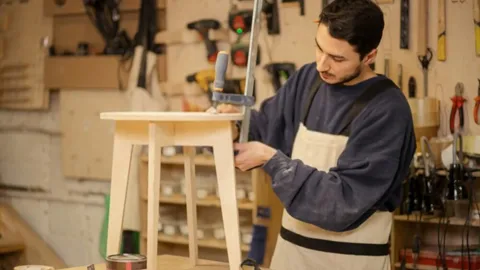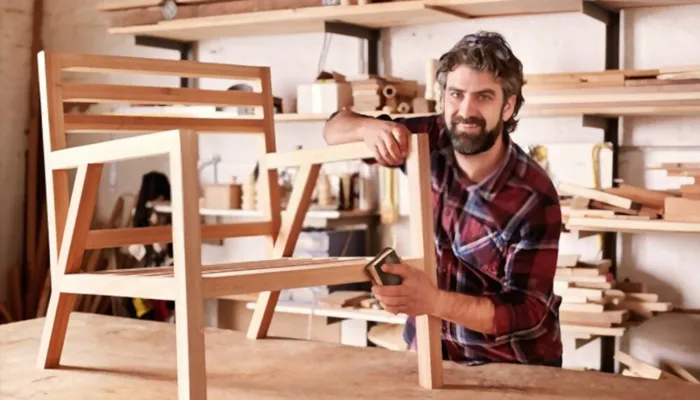WoodenuKnow.com is a participant in the Amazon Services LLC Associates Program, an affiliate advertising program designed to provide a means for sites to earn advertising fees by advertising and linking to Amazon.com and may earn from qualifying purchases.
Today, the career prospects for the average person are wider than ever before – with more people finding unique avenues to monetize their hobbies. The same goes for the unique and storied art of furniture-building.
Whether you are an upcycler-extraordinaire or a carpenter by trade, turning your work into a business has never been easier. But how exactly should you start?
Guide on Starting Your Own Furniture Business?

Of all the different types of businesses you could start, a furniture business has unique advantages. For one thing, furniture is a necessity, so there will always be people who want it.
In addition, starting a furniture business allows you to be creative and to express your style. Of course, as with any business, there are also some challenges involved in starting a furniture business. Below are some tips to help you get started.
Settle on a Niche:
Before you get stuck in planning your business, you should settle on what exactly your business is. When it comes to furniture, the sky’s the limit. With a little creativity and some basic woodworking skills, you can create unique and marketable pieces.
Some of the most popular include chairs, tables, dressers, and beds. To determine what type of furniture to sell, you need to consider your target market. For example, if you are selling to families, you will want to sell durable and easy-to-clean furniture.
You could build a simple side table using reclaimed lumber and an interesting piece of hardware. Or, you could create a set of colorful stools out of painted newly sawn wood. If you have a more ambitious project in mind, you could even build a piece of custom furniture to order.
On the other hand, if you are selling to college students, you may want to sell more affordable furniture that is easy to assemble. Regardless of your target market, it is important to have a variety of furniture to sell so that customers can find what they are looking for.
It can help define your offering, refine your planning, and keep the setting-up of your business as smooth and simple as possible. Choosing a specialty can also help you find a core customer base quicker, giving you a strong foundation on which you can continue to grow your business.
Draft Your Business Plan:
With the basics of your business nailed down, your next step should be to draw up a step-by-step plan for your business’ growth. A helpful way to envisage this is with the use of a broad timeline.
For example, a focused 1-year plan to figure out your first steps into trading and a five-year plan for thinking about big-picture decisions. Both are just as important as each other; you need to know where you’d like to be in three years’ time in order to make the right investments three months in.
Location Selection:
Anyone in the process of starting their own furniture business should give careful consideration to their chosen location. The most important factor to consider is the local market.
Does the area have a large enough population to sustain your business? Are there already a number of established furniture stores in the area? If so, can you differentiate your store in terms of selection, price, or customer service?
Another important factor is visibility. Is the location easy for potential customers to find? Is there adequate parking? Once you’ve taken all of these factors into account, you’ll be well on your way to choosing the perfect location for your new furniture business.
Get Licenses and Permits:

Before you can open for business, you will need to obtain the proper licenses and permits. You may need to get a state business license. For starters, you’ll need to obtain the proper authorizations and approvals from your city or county.
The type of business you are starting will also determine which licenses and permits you need. For example, if you will be manufacturing your own furniture, you will need to obtain a manufacturing license.
If you plan to sell your furniture online, you will need to obtain a sales tax permit. And if you will be running a brick-and-mortar store, you will need to obtain a business license from your city or county.
The process of obtaining a license or permit can be time-consuming, so it’s important to familiarize yourself with the requirements before you get started. Once you have obtained all the necessary documents, you will be ready to start your own furniture business.
Sole Trader Vs. Limited Company:
One of the bigger initial decisions you need to make relates to how you will operate as a company. You have two key options: working as a sole trader, or starting a limited company.
Operating as a sole trader essentially means working as a freelancer, where all income you receive from your business is your personal profit. Starting a limited company can be costlier but enables you to hire employees and separate your business assets from your personal ones.
Invest in Equipment:
As a hobbyist or someone with prior experience, you will likely already have enough tools to ply your trade. However, starting a formal furniture business presents you with the opportunity to invest properly in the tools of the trade.
Some tools can help you expedite processes; for example, a Milwaukee nail gun will enable you to build frames or upholster finished works quicker. You may also be able to invest in upgrades from your existing tools to guarantee longevity and a smoother workflow.
Market Your Business:
Truth be told, marketing your new business is an endeavor that deserves an article all of its own. There are many nuanced approaches you can take to effectively advertise your products and offerings, but the most effective place to start is with your social media platforms.
Awareness is the first step in any customer relationship, and building a following using social media platforms like Instagram and Facebook is a sure-fire way to start fostering that relationship.
With Instagram, you can advertise the quality of your work by posting professional pictures of your furniture; Facebook enables you to target local demographics with promoted posts, expanding awareness in your area.
Conclusion:
Starting a furniture business does require significant investment, but with the right research and planning, it can be a lucrative and rewarding endeavor. Be sure to investigate your local market, understand the difference between working as a sole trader versus starting a limited company, and invest in the proper tools and equipment.
With a little bit of effort, you can soon be on your way to success. Never be hopeless because you can achieve anything you set your mind to with the right mindset and attitude. We hope you find this article helpful in starting your own furniture business.




